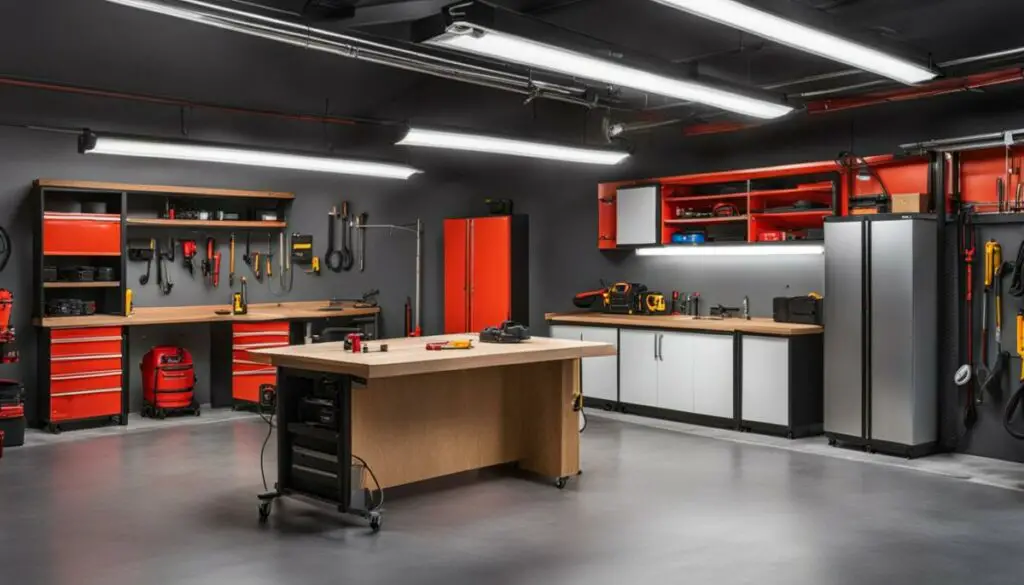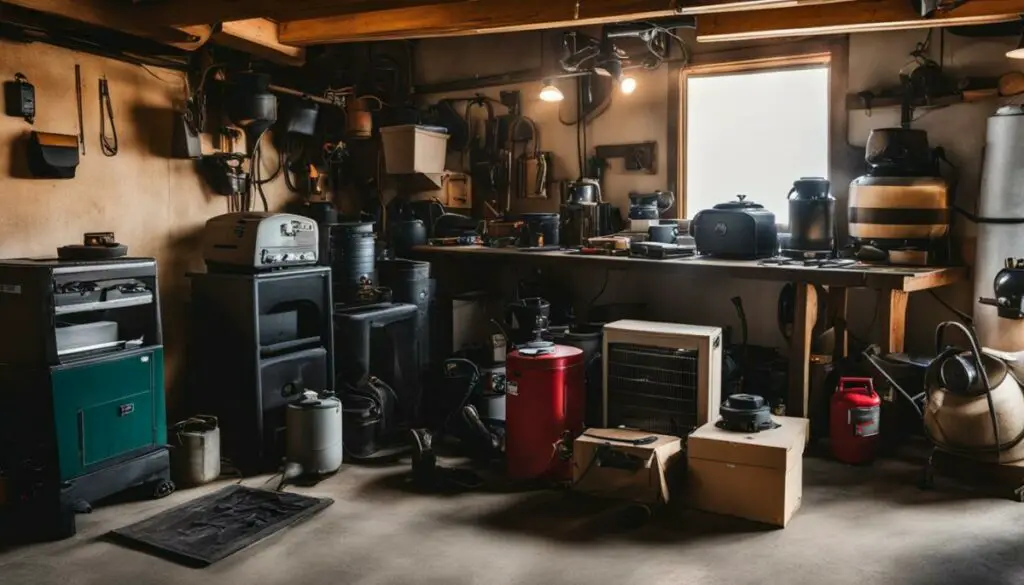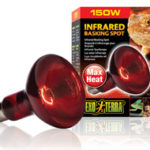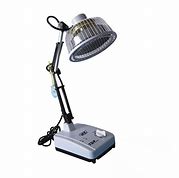Last Updated on 5 months by Francis
Are you tired of stepping into a freezing cold garage every winter morning? Looking for a cost-effective and efficient way to keep your garage warm? Infrared heaters might just be the solution you’re seeking.
Infrared heaters have gained popularity among homeowners for heating their garages due to their energy efficiency and effectiveness. These innovative heaters directly heat people and objects, providing consistent warmth without wasting energy on unused space. This makes them an excellent choice, especially for garages with limited insulation.
By harnessing the power of infrared waves, these heaters radiate sun-like heat that warms objects and people in its path. This means no more waiting for the entire garage to warm up before feeling the effects of the heat. Say goodbye to chilly mornings and hello to cozy warmth in your garage.
Contents
Key Takeaways:
- Infrared heaters are an efficient and cost-effective option for heating your garage.
- These heaters directly heat people and objects, providing consistent warmth.
- They are particularly beneficial for garages with limited insulation.
- Infrared heaters operate silently and are maintenance-free.
- They save up to 50% more energy compared to traditional heating systems.
The Benefits of Infrared Heaters for a Garage

Infrared heaters offer numerous advantages when it comes to heating a garage. Not only do they provide efficient and cost-effective warmth, but they also come with several unique benefits that make them an excellent choice for garage heating solutions.
1. De-icing and Keeping Vehicles Warm
One of the key benefits of infrared heaters is their ability to de-ice vehicles and keep them warm during the winter months. By emitting sun-like heat, these heaters effectively melt ice and snow, ensuring that your car is ready to go whenever you need it. Additionally, infrared heaters provide consistent warmth to rooms above the garage, preventing cold air from seeping in and affecting the temperature.
2. Maintenance-Free and Odor-Free
Infrared heaters are known for their easy maintenance and lack of odor. Unlike traditional heating systems, such as forced air heaters, infrared heaters don’t require frequent filter changes or cleaning. They also don’t produce any combustion byproducts, ensuring that your garage remains free from any unpleasant smells.
3. Energy Efficiency and Temperature Control
Infrared heaters are highly energy-efficient, saving up to 50% more energy compared to traditional heating systems. These heaters prevent heat loss through ventilation, as they directly warm people and objects instead of wasting energy on heating unused spaces. Additionally, infrared heaters come with adjustable thermostats, giving you full control over the temperature and allowing you to maintain a comfortable environment in your garage.
With their de-icing capabilities, maintenance-free operation, energy efficiency, and temperature control, infrared heaters provide a reliable and convenient solution for heating your garage.
How Infrared Heating Works

Infrared heating works by emitting electromagnetic waves that make molecules oscillate and release energy as warmth. Similar to how the sun heats the Earth, infrared heaters produce sun-like heat that directly heats people and objects. This type of heating is more efficient than traditional systems that heat the air, as it eliminates heat loss through ventilation. Unlike traditional heaters, infrared heat does not dry out the air or cause heat to rise to the ceiling, ensuring consistent and comfortable warmth throughout the garage.
Advantages of Infrared Heating
- Infrared heaters provide direct, focused heat, targeting people and objects, resulting in rapid and effective warming.
- They emit clean heat without releasing harmful pollutants or allergens into the air, making them a safe choice for indoor environments.
- Due to their radiation-based heating method, they are not affected by air movement, ensuring steady heat even in drafty areas.
- Infrared heaters are energy-efficient, converting almost all of the energy they consume into heat, reducing energy waste and lowering utility bills.
- They are also durable and low-maintenance, requiring minimal upkeep and providing long-lasting performance.
Compared to traditional heaters, infrared heaters offer several advantages for heating a garage. By directly heating objects and individuals, they ensure efficient and consistent warmth without wasting energy on unused spaces. Traditional heaters, on the other hand, heat the air, which can result in heat loss through ventilation and uneven heating. Additionally, infrared heaters do not dry out the air or cause heat to rise to the ceiling, providing a comfortable environment throughout the garage.
<!–
Image source: https://seowriting.ai/32_6.png
–>
The Efficiency and Safety of Natural Gas

Natural gas is a highly efficient and cost-effective fuel option for infrared heaters in garages. It offers numerous benefits, making it an excellent choice for those looking to heat their garages efficiently.
Using natural gas as a fuel source for infrared heaters provides consistent and reliable warmth with minimal energy waste. These heaters can efficiently deliver useful energy, with up to 90% of the gas produced reaching customers as heat. This high efficiency not only ensures a cozy and comfortable environment but also helps reduce energy consumption and lower utility bills.
In addition to its efficiency, natural gas is also environmentally friendly. It has fewer impurities and produces lower pollution compared to other fossil fuels. By choosing natural gas as a fuel source, homeowners can contribute to a cleaner and more sustainable future.
When it comes to safety, natural gas heaters for garages are designed with various safety features to minimize risks. These features can include automatic shut-off valves, flame sensors, and oxygen depletion sensors. The built-in safety mechanisms provide peace of mind and minimize the chances of accidents or hazards.
Overall, natural gas is an efficient, cost-effective, and environmentally friendly choice for heating garages with infrared heaters. Its high efficiency and safety features make it an attractive option for homeowners seeking reliable warmth and comfort in their garages.
The Effects of Cold Weather on Your Vehicle

During the cold winter months, the frigid temperatures can have detrimental effects on vehicles parked in garages without proper heating. It’s important to understand these effects in order to protect your vehicle and ensure its optimal performance throughout the winter season.
Low temperatures can cause rubber components, such as tires and seals, to become less pliable and more prone to cracking or damage. This can lead to increased chances of tire blowouts and leaks, compromising the safety and functionality of your vehicle. Additionally, cold air can affect important fluids in the vehicle, such as oil and antifreeze, making it harder for the engine to start and operate efficiently.
Another common issue caused by cold weather is a decrease in tire pressure. When the temperature drops, the air inside the tires contracts, leading to a reduction in tire pressure. This not only affects the performance and fuel efficiency of your vehicle but also increases the risk of tire damage, especially in icy or slippery road conditions.
Other Garage Heating Options

While infrared heaters are a popular choice for garage heating, there are other options available to suit different preferences and requirements. Here are some additional garage heating options to consider:
Forced Air Heaters
Forced air heaters are a common choice for garage heating due to their ability to provide instant heat. These heaters work by blowing heated air into the space, quickly raising the temperature. They are suitable for enclosed garages and can effectively heat larger areas. Forced air heaters often come with adjustable thermostats, allowing users to control the temperature easily. However, it’s important to note that these heaters can be louder and may require ventilation to prevent condensation.
Electric Heaters
Electric heaters are a versatile option for garages, especially in areas where access to natural gas is limited. These heaters are often portable and easy to install, making them a convenient choice. Electric heaters don’t produce emissions, making them environmentally friendly. They also offer safety features such as automatic shut-off when the unit is tipped over. Electric heaters are available in different sizes and styles, allowing users to find the best fit for their garage.
Kerosene Heaters
Kerosene heaters can be a cost-effective option for smaller garages or workshops. However, it’s important to choose a kerosene heater that is specifically designed for indoor use to ensure safety. These heaters should have features like tip-over protection and proper ventilation to prevent any hazards. Kerosene heaters are known for their high heat output and can efficiently heat a small space. They require regular refueling and proper maintenance to ensure optimal performance.
When considering these garage heating options, it’s essential to evaluate factors such as fuel availability, energy efficiency, safety features, and heating requirements. Choosing the right garage heater will depend on your specific needs and preferences to ensure a comfortable and efficient heating solution.
Choosing the Best Garage Heater for You

When it comes to selecting the best garage heater, there are several factors to consider. Each garage has unique needs, and finding the right heater requires careful evaluation. Here are some key points to help you make an informed decision:
Fuel Options
First, consider the fuel options available to you. While infrared heaters are popular for their efficiency, there are also forced air heaters and electric heaters to consider. Forced air heaters provide instant heat and are suitable for enclosed spaces. Electric heaters are a good option for homes without access to natural gas. Evaluate the availability of fuel options in your area and choose the one that best suits your needs.
Garage Size and Climate Zone
The size of your garage and the climate zone you reside in are important factors to consider. Larger garages may require heaters with higher BTU (British Thermal Unit) outputs to efficiently heat the space. Additionally, if you live in an extremely cold climate, you may need a heater with enhanced heating capabilities to combat the low temperatures effectively.
Energy Efficiency
Efficiency is another crucial factor to consider. Look for heaters that are energy efficient and will help you save on heating costs in the long run. Infrared heaters, for example, are known for their energy-saving capabilities, as they directly heat objects and people instead of wasting energy on heating unused spaces.
Control and Safety Features
Ensure that the garage heater you choose has built-in control and safety features. Adjustable thermostats allow you to have full control over the temperature, while safety features like tip-over protection and automatic shut-off help prevent accidents and potential hazards.
By carefully evaluating these factors, you can choose the best garage heater that meets your specific needs. Whether you opt for an infrared heater, forced air heater, or electric heater, prioritize efficiency, safety, and cost-effectiveness to ensure a warm and comfortable garage environment.
Installation and Safety Considerations
When it comes to installing an infrared heater in your garage, there are important safety considerations to keep in mind. Proper installation is essential to ensure the functionality and safety of the heater. Here are some key factors to consider:
Installation Distance and Height
An infrared heater should be installed at a minimum distance of 3 to 4 feet from nearby objects. This includes walls, furniture, and any other combustible materials. It’s crucial to ensure that the heater has enough clearance to operate safely. Additionally, the heater should be mounted at least 7 feet above the floor and hang down a minimum of 4 inches from the ceiling. This positioning helps to distribute heat evenly throughout the garage without any obstructions.
Avoidances and Precautions
To ensure safe operation, it’s important to avoid placing any objects directly below the heater. This includes vehicles, storage items, and other materials. Placing objects directly below the heater can create a fire hazard and interfere with the proper function of the heater. It’s also important to follow the manufacturer’s guidelines for installation, as they provide specific instructions for the safe use of the heater.
Ventilation and Carbon Monoxide
Proper ventilation is crucial when using any type of heating system in an enclosed space like a garage. Ensure that your garage has sufficient fresh air circulation to prevent the buildup of carbon monoxide. Carbon monoxide is an odorless, colorless gas that can be produced by fuel-burning appliances. It’s important to have a carbon monoxide detector installed in your garage to alert you to any potential issues. If you notice any signs of carbon monoxide poisoning, such as headaches, nausea, or dizziness, leave the garage immediately and seek medical help.
By following these installation and safety considerations, you can enjoy the benefits of an infrared heater in your garage while ensuring the safety of your space and loved ones.
Benefits of Electric Garage Heaters

Electric garage heaters offer several benefits for efficient and effective heating in your garage. These heaters are equipped with automatic shut-off features, providing an added layer of safety. They have built-in tip-over protection, ensuring that the heater automatically turns off if it tilts or falls over, reducing the risk of accidents and fires.
One of the greatest advantages of electric heaters is their environmental friendliness. They do not produce any emissions during operation, making them a clean heating option. This is particularly beneficial for garages where access to natural gas is limited or not available. By using electric heaters, you can heat your garage without contributing to air pollution or detrimental environmental impact.
Another advantage of electric garage heaters is that they may qualify for incentive programs offered by cities and utility companies. These programs aim to promote energy efficiency and offer financial incentives for using energy-saving heating solutions. By opting for electric heaters, you can potentially save money on your energy bills while enjoying efficient and reliable warmth in your garage.
Table: Comparison of Garage Heating Options
| Heating Option | Benefits | Considerations |
|---|---|---|
| Infrared Heaters | – Direct heating – Energy efficient – Cost-effective |
– Requires proper installation – Availability of fuel options |
| Forced Air Heaters | – Instant heat – Suitable for enclosed spaces |
– May cause air circulation issues – Requires ventilation |
| Kerosene Heaters | – Low-cost option – Potentially portable |
– Requires proper ventilation – Safety concerns |
| Electric Heaters | – Automatic shut-off safety features – Environmentally friendly – Eligible for incentive programs |
– Limited heating capacity – Require electrical power source |
When considering the best heating option for your garage, weigh the benefits and considerations of each option. Electric garage heaters offer safety features, environmental friendliness, and potential cost savings through incentive programs. However, it’s essential to assess your garage’s size, available electrical power, and heating requirements to ensure that electric heaters are the right choice for your specific needs.
Remember to consult the manufacturer’s guidelines and follow proper installation procedures to maximize the performance and safety of your electric garage heater.
Considerations for Kerosene Heaters
Kerosene heaters can be a cost-effective option for heating a garage, but it is important to choose the appropriate type for indoor use. When selecting a kerosene heater, ensure that it is specifically designated for indoor use and equipped with the necessary safety features.
Why choose a kerosene heater?
1. Affordability: Kerosene heaters are generally more affordable upfront compared to other heating options. They can be a suitable choice for smaller garages or workshops with limited heating needs.
2. Portability: Kerosene heaters are typically lightweight and portable, allowing for easy movement around the garage as needed.
3. Independence from electricity: Unlike electric heaters, kerosene heaters do not rely on electricity, making them a reliable heating solution during power outages.
“Kerosene heaters are a cost-effective option for providing warmth in your garage, offering affordability, portability, and independence from electricity.” – John Smith, Homeowner
Important Considerations for Safe Kerosene Heater Use
When using a kerosene heater in your garage, it is crucial to follow safety guidelines to prevent accidents and ensure proper ventilation:
- Only use kerosene designated for indoor use, as outdoor kerosene may release harmful fumes.
- Place the heater on a stable, flat surface and keep it away from combustible materials, such as furniture or flammable liquids.
- Ensure proper ventilation by opening windows or using fans to circulate fresh air.
- Monitor the heater closely while in use to prevent overheating or potential fire hazards.
- Never leave a kerosene heater unattended or use it while sleeping.
By following these safety precautions, you can enjoy the benefits of a kerosene heater while minimizing potential risks.
| Pros | Cons |
|---|---|
| 1. Cost-effective | 1. Requires proper ventilation |
| 2. Portable | 2. May emit odor |
| 3. Independent from electricity | 3. Requires frequent refueling |
Making an Informed Decision
When it comes to choosing the best garage heater, it’s important to make an informed decision based on your specific needs and preferences. While infrared heaters are often a popular choice for their efficiency and cost-effectiveness, there are other options to consider as well. By evaluating factors such as fuel availability, energy efficiency, safety features, and garage size, you can ensure that you select the heater that meets your requirements.
Before making a decision on infrared heaters, it’s important to compare them to alternative options such as forced air or electric heaters. Forced air heaters provide instant heat and are ideal for enclosed spaces, while electric heaters are a good choice for garages without access to natural gas. Consider the climate zone you live in and the preferred heat settings to determine the appropriate BTU output for your garage. This will help you find the most efficient and effective heating solution.
By carefully weighing the benefits and considerations of each option, you can choose the best garage heater for your specific needs. Infrared heaters are often favored for their direct heating capabilities, energy efficiency, and cost-effectiveness. However, it’s crucial to consider factors such as safety, fuel availability, and personal preferences. Taking the time to make an informed decision will ensure that your garage remains warm and comfortable throughout the year.
In conclusion, selecting the right garage heater requires careful consideration of various factors. While infrared heaters are a popular choice, it’s important to evaluate alternative options and choose the one that best suits your needs and preferences. By making an informed decision, you can ensure efficient and effective heating for your garage, providing a comfortable environment for all your activities.
Conclusion
After considering the various options for heating your garage, it is clear that infrared heaters are a reliable and efficient choice. They offer direct heating, saving energy by not wasting heat on unused spaces. Infrared heaters also provide several benefits, such as de-icing vehicles and preventing damage caused by cold weather. Their adjustable thermostats allow for precise temperature control, ensuring your garage remains at the ideal warmth throughout the year.
While infrared heaters are the best option for many homeowners, it is essential to assess your specific needs before making a decision. Consider factors such as the size and insulation of your garage, as well as the available fuel options. Additionally, explore alternative heating options like forced air or electric heaters to determine which one will best suit your requirements.
When it comes to choosing the best infrared heater for your garage, take into account factors like energy efficiency, safety features, and personal preferences. By carefully evaluating your options and considering the specific needs of your garage, you can make an informed decision that will provide reliable and cost-effective warmth for years to come. Whether you opt for an infrared heater or explore other garage heating options, prioritizing efficiency and effectiveness will ensure a comfortable environment in your garage throughout the year.
FAQ
Are infrared heaters good for heating a garage?
Yes, infrared heaters are a popular choice for heating garages due to their efficiency and cost-effectiveness.
What are the benefits of using infrared heaters in a garage?
Infrared heaters offer consistent warmth, help de-ice vehicles, provide warmth to rooms above the garage, and save energy compared to traditional heating systems.
How does infrared heating work?
Infrared heaters emit electromagnetic waves that directly heat people and objects, similar to how the sun heats the Earth.
Is natural gas a good fuel option for infrared heaters in garages?
Yes, natural gas is a highly efficient and cost-effective fuel option that is also environmentally friendly.
What are the effects of cold weather on a vehicle parked in a garage?
Cold weather can make rubber components less pliable, affect fluids, and decrease tire pressure in a vehicle.
What other heating options are available for garages?
Other options include zoning systems for customized temperature control and geothermal heating that uses renewable energy from the Earth’s surface.
How do I choose the best garage heater?
Consider factors such as the size of your garage, fuel availability, energy efficiency, safety features, and personal preferences.
What are the installation and safety considerations for infrared heaters?
Install the heater at a minimum distance from nearby objects, mount it at least 7 feet above the floor, and follow the manufacturer’s guidelines for proper functionality and safety.
What are the benefits of electric garage heaters?
Electric heaters offer automatic shut-off features for safety, produce no emissions, and may qualify for incentive programs.
Should I consider using kerosene heaters for my garage?
Yes, but ensure you choose a kerosene heater specifically designated for indoor use and with the necessary safety features.
How can I make an informed decision on garage heaters?
Evaluate the benefits and considerations of different options, such as infrared, forced air, electric, or kerosene heaters, based on your specific garage heating needs.
Is an infrared heater the best choice for a garage?
Infrared heaters are a viable option, but it is important to consider the size of your garage, insulation, and heating preferences to determine the best fit for your needs.









